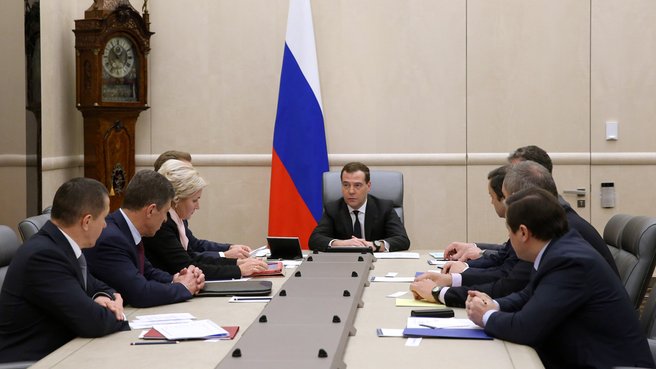Agenda: implementation of the presidential instructions on the Far East and Siberia; the online kindergarten waiting list; and results of the programme on reduced car loan rates.
Dmitry Medvedev’s opening remarks
Transcript:
Dmitry Medvedev: This is our first meeting in the new year. I’d like to wish a Happy New Year to those I am seeing for the first time this year. A few words on what we have to do. First of all, we need to focus on implementing the presidential address. I’ve signed the relevant instructions along with the President. I think we should organise a meeting on enhancing the investment appeal of the Far East.
I won’t explain why because you know all that. The Government has been instructed to determine the criteria for designating certain regions as advanced socioeconomic development areas, such as the Far East and Eastern Siberia, including Khakassia and the Krasnoyarsk Territory. We must develop such criteria, compile a list of eligible regions, draft relevant norms and regulations, and build up the infrastructure in these places. As the President said in his address, I’ll be personally responsible for this task and monitor its implementation. So we must hold a meeting. I’d like to ask Mr Shuvalov, Mr Trutnev and Mr Prikhodko to organise it. Let’s discuss this issue, which is a difficult one because it lies at the intersection of macroeconomics and regional development. All volunteers are invited to join these efforts.
A few words about the programme on reduced car loan rates that we carried out from July to the end of 2013. It was designed to support car makers and allow our people to buy cars using loans with reduced interest rates. They could choose from among the 50 models on the list approved by the Ministry of Industry and Trade. No car on the list cost over 750,000 roubles. Many of our banks took part in this programme. They offered interest rates below the market. Needless to say, such programmes cannot last forever. I’m curious about what we’ve achieved and if we should adopt a similar programme or any other measures in the future. Mr Dvorkovich, go ahead please.
Arkady Dvorkovich: Mr Medvedev, ladies and gentlemen. Before this programme took effect, that is before July, we expected domestic car production to decrease by 7%-8%.
Arkady Dvorkovich: Banks issued 260,000 reduced-rate car loans on 800,000 applications. If it were not for this programme, banks would have probably issued loans to just 100,000-150,000 borrowers rather than 260,000.
Dmitry Medvedev: This was not just a forecast. Car production already had begun to decline, and that’s why we introduced the programme.
Arkady Dvorkovich: Yes, that’s how it was. It had started to decrease and we believed that additional measures would be required to stop this trend. Car manufacturing went down last year. It didn’t stop altogether but it declined by just 1.8%.
Dmitry Medvedev: Compared to 2012?
Arkady Dvorkovich: Yes, 2012. A decline in car production and demand for cars occurred in all leading European countries, except the United Kingdom. We were not alone – this is a pan-European trend. Nevertheless we managed to considerably improve the situation, change the trend and stabilise production near the end of the year. Banks issued 260,000 reduced-rate car loans on 800,000 applications. Now they are more careful about choosing their borrowers because household debt is already fairly high. But if it were not for this programme, banks would have probably issued loans to just 100,000-150,000 borrowers rather than 260,000. The programme allowed people to buy cars for less money, and car production stabilised as a result.
It should be noted that 80% of cars purchased with these loans were Russian made, and only 20% were imported. Everyone gained – our traditional producers, primarily AvtoVAZ and GAZ, and assembly plants that have achieved fairly high level of localisation in this country. So the programme has worked as intended.
Total federal budget obligations for the programme for 2013-2016 (loans were issued for two to four years) will reach eight billion roubles, but in 2013 we received over 20 billion roubles in value added tax and excise taxes on cars sold. The advantages for tax payers are also obvious. We’ve supported our car makers during a time of declining demand and when the terms of our WTO membership will only get tougher with every year. This transitional period will last until 2018. We’ll see how it goes in the first quarter. If the situation does not remain stable or better, we’ll suggest a similar programme for 2014.
Dmitry Medvedev: Obviously, this programme is useful for car producers and car owners. But we must keep an eye on the loan market so as to prevent excessive household debt and other risks that our financial system cannot afford. I’m referring not just to car loans but in general to the development of consumer lending and the condition of the domestic credit market.
Okay. If you decide that we should continue this programme, please submit proposals together with Mr Manturov (Denis Manturov, Minister of Industry and Trade).
Arkady Dvorkovich: Will do.
Dmitry Medvedev: Settled. Thank you.
<…>











